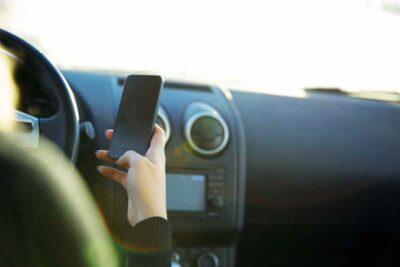
As of July 1, 2018, Georgia’s Hands-Free Law went into effect. This law was called the biggest change to Georgia’s traffic laws in decades—and it affects virtually every driver on the road. Below, we’ve got an in-depth look at how the law works (and all of its surprising exceptions). But first, here’s a quick overview of the “need-to-know” rules.
Under the Hands-Free Law:
- You can’t hold your phone for just about any reason except emergencies
- You can’t touch your phone (even if not holding it) except to receive a phone call—no texting!
- You can’t watch videos, and you can’t listen to music through earbuds/headsets
- GPS is okay as long as you program the destination before you start driving
- Hands-free calls are okay (even with a headset), and so are voice-only for texting or other purposes
Sound simple? It may not be.
What Counts as Holding a Phone?
Under the Hands-Free Law, “holding” the phone means holding it with your body/person—even if you’re not using your hands. (We know, this defies the meaning of “hands-free,” which has a lot of people confused.)
That Means:
- Holding it with your shoulder? Not allowed.
- Setting it on your lap? Not allowed.
- Tucking it into a front shirt pocket, headscarf, or anywhere else where you’re actively using it while driving? Not allowed.
Here’s What IS Allowed:
- Putting your phone on a phone mount in your car is fine.
- So is setting it in the cupholder, on the front seat next to you, or anywhere else in the car—even though it may be distracting to try to use it in these places.
Basically, if it’s on your body, you’re “holding” your phone and likely breaking the Hands-Free Law.
Get the strong arm
Can You Touch Your Phone?
In general, there’s only one situation where it’s OK to touch your phone: accepting a phone call from someone. The rest of the call has to be hands-free or done through a headset, and you still can’t “hold” the phone or have it on your body.
Otherwise:
- If you’re using GPS, you need to program it before you start driving
- If you’re streaming music, you can’t touch the phone to skip tracks or change playlists (or any other reason)
- In general, if it’s not to accept or end a voice call, don’t touch your phone at all.
If in doubt, leave the phone alone or pull over and park before you touch it.
What About When You’re Parked? Can You Use Your Phone Then?
Georgia’s Hands-Free Law makes a big distinction between being parked and being stopped. Here’s why:
- If you’re stopped, the Hands–Free Law still applies. This includes red lights, stop signs, traffic jams, or stopping anywhere on the road.
- If you’re legally parked, you can use your phone. As long as the place your car is parked is a legitimate place to park, you can text, make calls, watch videos, or anything else.
In practical terms, that means it IS okay to pull over to use your phone, as long as you put the vehicle in “park” and you’re not in a No Parking zone or anywhere else illegal.
What Are the Exceptions to When You Can Hold a Phone?
They’re pretty limited, and they mostly revolve around emergencies. For example:
- Report an emergency. You can use your phone in your car to report a traffic accident, a medical emergency, a crime, a fire, or hazardous road conditions. You are allowed to use your hands to do so, although you should still drive safely and, ideally, pull over first if you can (Georgia’s other laws about distracted driving are still in effect).
- First responders like police/law enforcement, EMS crews, and firefighters are exempt during the course of duty.
- You can use your phone when parked (not stopped) as noted above, as long as it’s a legal place to park.
Additionally, utility workers may use devices in their vehicles while acting in the scope of their job duties and dealing with a utility emergency.
What About Commercial Truckers and School Bus Drivers?
Both commercial drivers and school bus drivers face stricter rules for cell phone usage behind the wheel than ordinary citizens, as they should.
Commercial Drivers
Commercial drivers of any kind, while driving a commercial vehicle:
- Must obey all the Hands-Free Law rules, but can only use a single touch to receive or end a call (the “one-tap” rule); and
- Cannot reach for a device such as a phone if it required them to not be in a proper, seated position (or take their belt off).
School Bus Drivers
School bus drivers, on the other hand:
- Cannot use any device (including the two-way radio) while loading or unloading passengers; and
- Can only use their two-way radio device while the bus is in motion, not any other device (if a phone is used as the two-way radio, it can only be used in this mode while the bus is moving).
Does Georgia’s Hands-Free Law Make People Safer?
This is the biggest question of all. The truth is, from a legal perspective, not a lot has changed. It was already illegal to drive distracted, and people did it anyway. Plus, this new law has so many exceptions and special rules, it’s often confusing. Are you really “safer” if someone can look at a phone on the seat next to them while driving?
However, this new law does one big thing that Georgia’s older laws didn’t: it makes it easy to get in trouble for using a phone while driving – period. Sure, some of the rules may be a little wonky, but the bottom line is not to touch your phone while behind the wheel. And for police, it’s also simple: see someone using a device while driving? Pull ’em over.
Or to put it another way:
If you’re caught using a device while driving, the burden is on YOU to prove you were using it in a lawful way.
Of course, maybe you really were calling in a traffic hazard or you were only making a hands-free call, not listening to music. But an officer might just pull you over when they see the device, and you’re going to have to explain to them what you were doing.
Does This Law Reduce Deaths and Injuries?
Will that actually lower the rates of traffic accidents, injuries, or deaths? No one knows. We might see a slight downward nudge in the statistics, but that could take several years to prove.
And, similarly, it may or may not change how accident cases are handled. If a driver is distracted by their device and causes an accident, that driver is likely at fault and, therefore, liable for the accident.
While that’s already true under existing Georgia law, under the Hands-Free Law, more of these drivers might get tickets… but only if you can prove they used their device and broke the law. This is why it’s so important to have a good car accident lawyer.
If You Were Injured By a Distracted Driver, Our Attorneys Can Help
No matter how illegal it is, some people will still drive distracted. If you’ve been hurt in an accident that wasn’t your fault, the attorneys of John Foy & Associates can help you.
For over 20 years, we have been Georgia’s champion for those who were injured—and we get results. Call us or fill out the form to the right to set up your FREE consultation right away.
(404) 400-4000 or complete a Free Case Evaluation form




